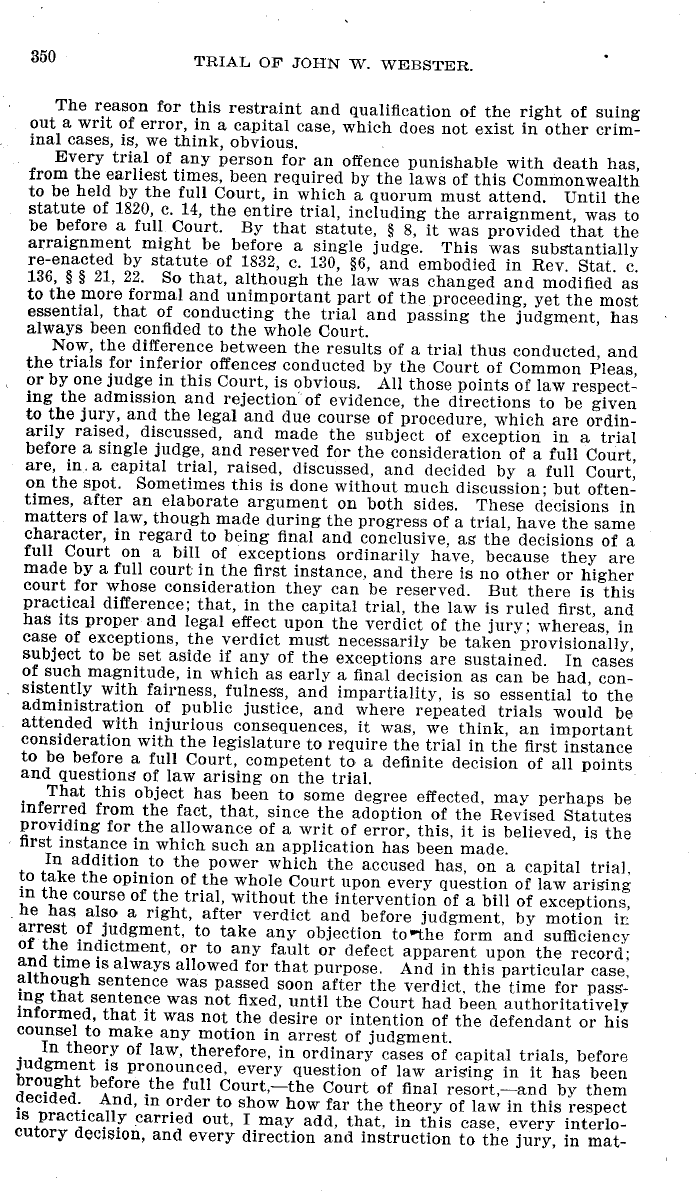|
350 TRIAL OF JOHN W. WEBSTER.
The reason for this restraint and qualification of the right of suing
out a writ of error, in a capital case, which does not exist in other crim-
inal cases, is, we think, obvious.
Every trial of any person for an offence punishable with death has
from the earliest times, been required by the laws of this Commonwealth
to be held by the full Court, in which a quorum must attend. Until the
statute of 1820 c. 14, the entire trial, including the arraignment, was to
be before a full Court. By that statute, § 8, it was provided that the
arraignment might be before a single judge. This was subgtantially
re-enacted by statute of 1832, c. 130, §6, and embodied in Rev. Stat. c.
136, § § 21, 22. So that, although the law was changed and modified as
to the more formal and unimportant part of the proceeding, yet the most
essential, that of conducting the trial and passing the judgment, has
always been confided to the whole Court.
Now, the difference between the results of a trial thus conducted and
the trials for inferior offences conducted by the Court of Common Pleas,
or by one judge in this Court is obvious. All those points of law respect-
ing the admission and rejection of evidence, the directions to be given
to the jury, and the legal and due course of procedure, which are ordin-
arily raised, discussed, and made the subject of exception in a trial
before a single judge, and reserved for the consideration of a full Court,
are, in. a capital trial, raised, discussed, and decided by a full Court,
on the spot. Sometimes this is done without much discussion; but often-
times, after an elaborate argument on both sides. These decisions in
matters of law, though made during the progress of a trial, have the same
character, in regard to being final and conclusive, as the decisions of a
full Court on a bill of exceptions ordinarily have, because they are
made by a full court in the first instance, and there is no other or higher
court for whose consideration they can be reserved. But there is this
practical difference; that, in the capital trial, the law is ruled first,
and
has its proper and legal effect upon the verdict of the jury; whereas, in
case of exceptions, the verdict must necessarily be taken provisionally,
subject to be set aside if any of the exceptions are sustained. In cases
of such magnitude, in which as early a final decision as can be had, con-
sistently with fairness, fulness, and impartiality, is so essential to the
administration of public justice, and where repeated trials would be
attended with injurious consequences, it was, we think, an important
consideration with the legislature to require the trial in the first
instance
to be before a full Court, competent to a definite decision of all points
and questions of law arising on the trial.
That this object has been to some degree effected, may perhaps be
inferred from the fact, that, since the adoption of the Revised Statutes
providing for the allowance of a writ of error, this, it is believed, is the
first instance in which such an application has been made.
In addition to the power which the accused has, on a capital trial,
to take the opinion of the whole Court upon every question of law arising
in the course of the trial without the intervention of a bill of exceptions,
he has also a right, after verdict and before judgment, by motion ir_
arrest of judgment, to take any objection to~the form and sufficiency
of the indictment, or to any fault or defect apparent upon the record;
and time is always allowed for that purpose. And in this particular case,
although sentence was passed soon after the verdict, the time for pass-
ing that sentence was not fixed, until the Court had been authoritatively
informed, that it was not the desire or intention of the defendant or his
counsel to make any motion in arrest of judgment.
In theory of law, therefore, in ordinary cases of capital trials, before
judgment is pronounced every question of law ariging in it has been
brought before the full Court, the Court of final resort, and by them
decided. And, in order to show how far the theory of law in this respect
is practically carried out, I may add, that, in this case, every interlo-
cutory decision, and every direction and instruction to the jury, in mat-
|

